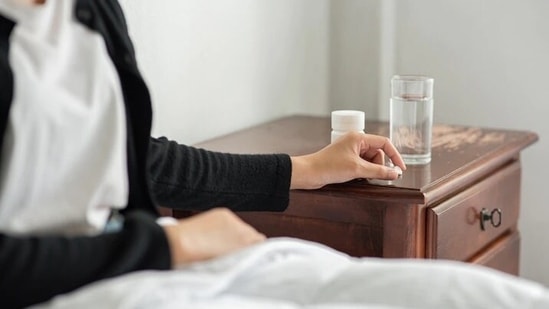From hindustantimes.com
How you unwind after a long day can make a great difference to your overall health. Here are important bedtime rituals for people with diabetes
“Ending your day sets the tone for your sleep as well as the coming day. For people suffering from diabetes, maintaining even the most basic routine is challenging. You have to watch everything from what you eat, how much you sleep and how active you are in terms of physical activities. What may add to your woes in when there are additional leg or joint issues and you cannot work them out. In all the chaos, managing your bedtime routine can be less stressful and hits two birds with one stone- a good night's sleep and a fresh morning," says Dr Jothydev Kesavadev, Diabetologist, Executive Committee, RSSDI.
Here are some expert tips to design an easy bedtime routine for people with diabetes that can help stabilise their blood sugar levels.
Limit the intake of caffeine
"Stay away from sources of caffeine including coffee, tea, chocolate and soda a few hours from bedtime. Caffeinated foods and drinks act as stimulants and can keep you awake. Also, limit alcohol intake, especially if you know that it affects your sleep," says Dr Sandeep Kharb, Sr. Consultant - Endocrinology, Asian Hospital, Faridabad.
Take a stroll before bedtime
"Any form of physical activity helps effective utilisation of insulin by your body. Also, it helps to reduce stress and prepare your mind before bed. Taking a walk before bedtime or after dinner may help to keep your sugar levels stable through the night. However, exercising too close to bedtime may have a negative impact on your sleep," says Dr Kharb.
How much to sleep
Dr Kesavadev says one should sleep for optimum hours to manage their blood sugar levels. He says it's recommended to sleep for more than 6 hours and not more than 8 hours.
Avoid snacking late in the night
"Late-night snacks are off the plate. Especially fatty foods, extra calories, and carbohydrates are not recommended to such patients as a result of avoiding weight gain. You’ll wake up with increased blood sugar levels which also has the capability to ruin the progress your medications and treatment made," says Dr Kesavadev.
Eat light, stay away from devices
"Dietary practices also have a huge impact on sleep patterns. It is always better to pick some light snacks before sleep instead of a full meal. Avoid large meals late at night. Eating late can cause indigestion and higher blood sugar levels overnight. Get some physical activity during the day. Keep your bedroom dark, quiet, relaxing, and cool. Remove electronic devices such as TVs, computers, and smartphones from the bedroom," says Dr Maheshwari.
Check your blood sugar level
"While regular blood sugar checks are an essential part of managing your diabetes, bedtime is another good time to test. It is a good idea to maintain your blood sugar levels within the acceptable range during bedtime. Though it is natural for blood glucose levels to be on the higher side if you have had a meal in the last two hours. If it is on the lower side of the range, you may consider night-time snacking to prevent from going too low," says Dr Kharb.
Plan your meals for the next day
"Pack the next day’s lunch or prepare like do cutting, chopping etc that you would need the next day. Once you have already kept fruits and vegetables aside you will have to utilize them and there would be no space for junk," says Dr Jothydev Kesavadev.
Brush your teeth
"People with diabetes are prone to catch gum and mouth issues. Brush your teeth regularly, twice a day if required. Use floss and let mouth care be an important part of your bedtime routine," says Dr Kesavadev.
Optimise your bedroom for sleep
"It is a good idea to prepare your bedroom for sleep so that you wake up refreshed. For this, maintain a comfortable ambience – dim the lights closer to bedtime, close the curtains so that early morning sun won’t disturb your sleep. Noise can disturb your sleep and leave you awake at night. Keep your cell phone far from your bed so that incoming calls and texts do not wake you up in the middle of the night. If you are extra sensitive to noise, use earplugs to block out any unwanted sounds," says Dr Kharb.
Set a bedtime routine
"Another way to maximize your sleep hours is to set a bedtime routine. Just before you hit the bed, do something to quiet your mind and relax your body to prepare for sleep. You can take a warm bath, or do some gentle yoga, read a book, listen to relaxing music among others," says Dr Sandeep Kharb.

No comments:
Post a Comment